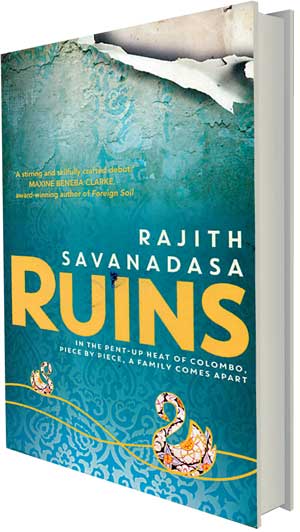Reply To:
Name - Reply Comment
Last Updated : 2024-04-26 15:05:00

With his debut novel ‘Ruins,’ Rajith Savanadasa joins that increasingly-long list of Sri Lankan expatriate writers which includes names like Michael Ondaatje and Romesh Gunasekara.
Savanadasa lives in Australia but this story takes place in Sri Lanka, with only scant reference to his adapted country. It is set during the final stages of the war, and brings out a tangle of relationships – mother and father, parent and child, interracial marriage, employer and domestic, and so forth, while events changing the country’s future drastically take place in the background. As the story progresses, one can see similar tumultuous changes taking place in the lives of these characters. These two streams run parallel.

‘Ruins’ is about the family of newspaper editor Manoratne Herath and their domestic servant. The many contradictions and complexities of Sri Lanka’s social fabric are woven into this tale – ethnic Sinhalese editor working in the English medium, his Tamil wife Lakshmi – both with urban backgrounds and tastes, their worldly and sophisticated children Niranjan and Anoushka, and Latha, the Sinhalese domestic servant from a remote village.
The authour uses the technique of first person narrative using different characters. This has been used by novelists as diverse as William Faulkner and Mario Vargas Llosa. This reviewer couldn’t help feeling that a straightforward third person narrative technique might have worked better. The ‘voices’ work best when the authour ‘speaks’ from the point of view of youth -- Niranjan and Anoushka.
Theirs are in fact the most interesting chapters. One can see that this young novelist understands their continually varying and vivid worlds very well. A loss of momentum was felt when the other ‘voices’ started narrating – Mano, Lakshmi and Latha. However, what they narrate offers a series of perspectives radically different from what a third person narration would tell us – for example, the Lakshmi that Latha sees is not the same person that Lakshmi believes herself to be. This is true of all the other characters and the chapters offer conflicting ‘mirror’ images of the key characters.
Events unfold in two parallel streams – personal and at the national level. As the cracks and fissures within Mano’s family circle are revealed, the tectonic shifts created in the country’s sociopolitical foundation are shown, too, as the war machine gets into high gear and people suddenly realise the war is drawing to an end.
At some point, one wonders which narrative line is more important – the personal or the public. Sometimes, they seem to blend into one. Savanadasa has a keen sense of history in the making, but he doesn’t allow his characters to get submerged by these events, intense as they are during the final days of the war and based on actual events – the white flag incident, and marauding ministers looking to rough up reporters.
The writing reveals an expatriate’s nostalgia for the home turf. Savanadasa’s detailed descriptions of Colombo’s well-known streets and neighbourhoods are proof of that. What is irksome is his frequent mixing of colloquial Sinhala with English – ‘the sudu kakul she showed off in those short skirts’ ‘Budu ammo, I still remember,’ ‘rahu kalaya’ and so forth.
In 19th century English and Russian novels, one can find many French words as that was the language of diplomacy and high culture at that time, and there was a time when many writers in English, including Sri Lankans, peppered their writing with Latin, and Indian writers sometimes mixed their English with Hindi phrases. But this sort of thing needs to be done with restraint. One can argue that it’s quite all right to use Sinhala words if we find French, Latin and Hindi in both fiction and non-fiction.
But, at least as far as French and Latin was concerned, the writing was meant for a readership presumably educated in those languages. ‘Ruins’ is an English novel about Sri Lankans, and it offers us a multi-ethnic and multi-cultural reading experience. Not all its readers, one presumes (whether here or in Australia) understand what ‘Rahu Kalaya’ means. As such, a glossary of such words should have been provided.
This is a crowded novel and sometimes there seem to be too many characters getting in the way of the principal narrative. Despite these minor blemishes, ‘Ruins’ is a very promising first novel and points to more exciting things from its young authour.

Add comment
Comments will be edited (grammar, spelling and slang) and authorized at the discretion of Daily Mirror online. The website also has the right not to publish selected comments.
Reply To:
Name - Reply Comment
US authorities are currently reviewing the manifest of every cargo aboard MV
On March 26, a couple arriving from Thailand was arrested with 88 live animal
According to villagers from Naula-Moragolla out of 105 families 80 can afford
Is the situation in Sri Lanka so grim that locals harbour hope that they coul